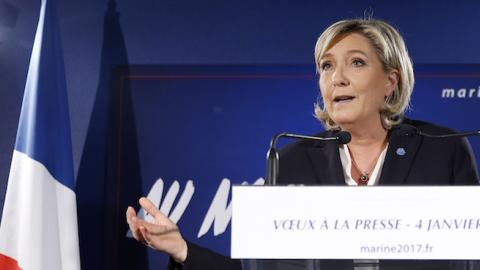As Theresa May lays out her plans for a clean break from the EU, Marine Le Pen is trying to sell French voters on her own vision for a French exit. The Wall Street Journal reports:
She last ran in 2012 with an initial promise of a sharp and sudden break from the euro, but this time Ms. Le Pen has sought broader support from a splintered French electorate. She says she would organize an orderly exit rather than crashing out with unpredictable consequences. If elected, she and top National Front officials say, her administration will spend its first six months negotiating the creation, along with other disappointed euro nations, of a basket of shadow European currencies. A newly reinstated franc, she says, would eventually be pegged to that basket, replacing the euro.
Ms. Le Pen says other countries struggling to meet European rules would be willing to enter into talks on pulling the EU apart. The threat of having to leave the euro, she says, has been used to blackmail Greece and other Southern European countries into implementing austerity programs their people reject.
“The euro has not been used as a currency, but as a weapon—a knife stuck in the ribs of a country to force it to go where the people don’t want to go,” Ms. Le Pen told reporters earlier this month. “Do you think we accept living under this threat, this tutelage? It’s absolutely out of the question.”
Le Pen's description of the Euro as a “knife in the ribs” forcing countries to go where their people don't want to go is sadly accurate. The fact that this message is gaining traction in Europe's second largest country only testifies to the depth of Europe's current credibility crisis.
The real challenge to Europe isn't Putin and it isn't Trump: it's the internal divisions over economics, the weak nature of EU institutions, the absence of a commitment to any serious military role as geopolitics return to center stage, and the egotism of European countries—Germany very much included—that makes the development of genuinely European policy so difficult.
It would be better, pace Trump, for U.S. interests if the EU manages to reform itself and become a strong and dynamic power committed to liberal order. And there have been signs that the French electorate could embrace a vision along these lines: Emmanuel Macron, the independent candidate who has embraced EU membership but stressed the need for major reforms, is currently surging in the polls. Still, the reality remains that the EU has so far not been very good at reforming or adjusting to popular preferences—and the world is changing fast.

















